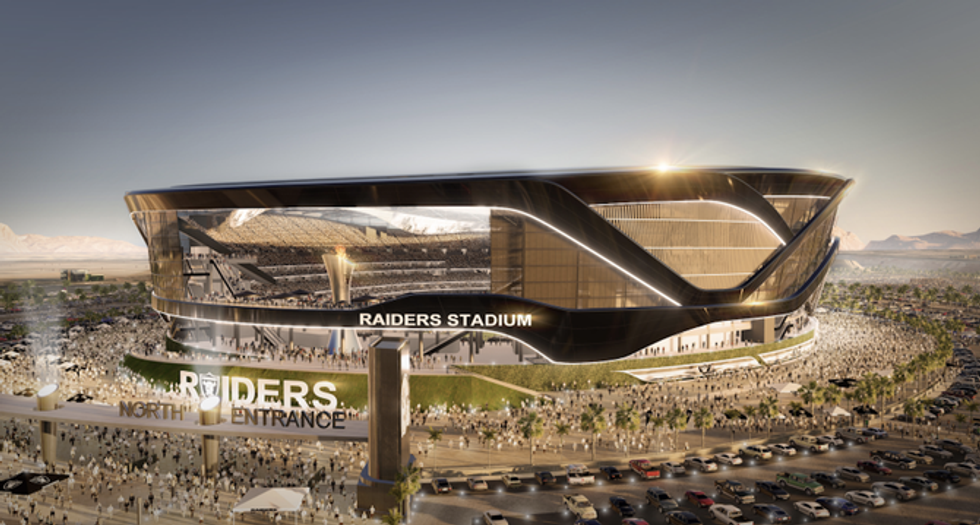The Oakland Raiders, an NFL football team known for its devoted fanbase, may be migrating to Las Vegas, Nevada. Discussion rages across Nevada, and excited voices chatter across Sin City. Even residents of Utah are pumped.
The migration from Oakland to Las Vegas, which was previously a pie in the sky, became very real last week when the Oakland Raiders filed to trademark “Las Vegas Raiders.” Apparently, they're serious. A video depicting a lavishly chic stadium in the proposed location also infiltrated the public air-space:
However, the stadium deal has also invited controversy. The scheme for financing the stadium divides the cost between private donors, like the Raiders franchise and the Sands Corp., and the public. As of now, the scheme will require a 0.88% increase on the hotel tax. It also asks the public for $750 million—a cost that many argue is far too high. The deal for financing the stadium has caused such a tense stand-off that Rob Goldstein, the CEO of the sponsoring Las Vegas Sands Corp., has threatened to pack up and leave:
“The numbers aren't going down. If we can't get $750 [million], we respectfully say thank you and move on.”
No one is certain whether or not he's bluffing.
The Sands Corp. owns casinos from Las Vegas to Macau. In turn, Sands is owned by one of the richest men in the world—Sheldon Adelson. Since the Las Vegas Raiders is widely described as his passion project, it seems unlikely that the Sands Corp. will back down. The Sands Corp. is actually listed to pay $100 million less than the public—a figure they may be able to budge on, if their boss is committed to the project as much as he seems.
Adelson has been busy to turn the tide in his favor. The Las Vegas Review-Journal, the city newspaper and recent acquisition of the city's most well-known billionaire, has begun pressuring political candidates for office all across the valley. Reporters are supposed to ask politicians' views on public funding, but there is no plan to use the answers for journalistic purposes. Jon Ralston puts it this way:
“Why ask a question of candidates that will not be used in the paper? Are they getting a head count for Adelson? Reminding candidates that the newspaper could be used as a bludgeon?"
The stadium deal is facing an uphill battle. Although the Review-Journal can affect public perception of political candidates, opposition to public funding may actually be a favorable political stance. According to a recent poll, 55 percent of Las Vegas citizens think taxpayer dollars shouldn't be devoted to the stadium at all. Only 35 percent agree with the status quo scheme. Rather than focus on influencing candidates, maybe Adelson should focus on influencing the public to change its mind.
Are concerns about the economic cost of the stadium justified, though?
The answer depends on who you ask. $750 million is a higher cost to the public than any other stadium deal, ever, and the tax revenues would be diverted away from the Las Vegas Convention Center expansion project currently underway. Incidentally, the main competition for the Convention Center is owned by the Sands Corp, so the large public burden benefits Adelson's company in more ways than one. According to the Las Vegas Sands, however, the stadium will pump $600 to $800 million into the local economy per year. The calculation is based on the estimate of fifteen stadium events annually. That would cover the cost to taxpayers within just one calendar's worth of time. The stadium would totally make economic sense, if the data trumped by the Sands is accurate.
Most experts aren't convinced.
Victor Matheson and Rob Baade, sports economists in the ivy towers of academia, argue that the numbers are “outside the norm,” and the methods that led to the positive economic forecast “fatally flawed.” They suggest that tourist and local dollars would be funneled into the stadium, but those dollars would be simply redirecting from other places where they would have been spent regardless. Roger Noll, a Stanford expert on sports economics, has also asserted that sports stadiums in general have almost no effect on local economies. Oakland and St. Louis are still paying off debts for abandoned stadiums, Noll points out. 58 percent of economists agreed that "local and state governments should eliminate subsidies," like the Las Vegas stadium deal, "to professional sports franchises." Only 5 percent disagreed.
Neil DeMasse, who wrote a book on the subject of stadium financial schemes and their burdens, is definitely not a fan of the Las Vegas Raiders deal.
“The question for me is not whether this is a bad deal for Nevada — it’s how bad of a deal.”
The cards are stacked against Sheldon Adelson. Maybe the Sands Corp. should reconsider its position.






















